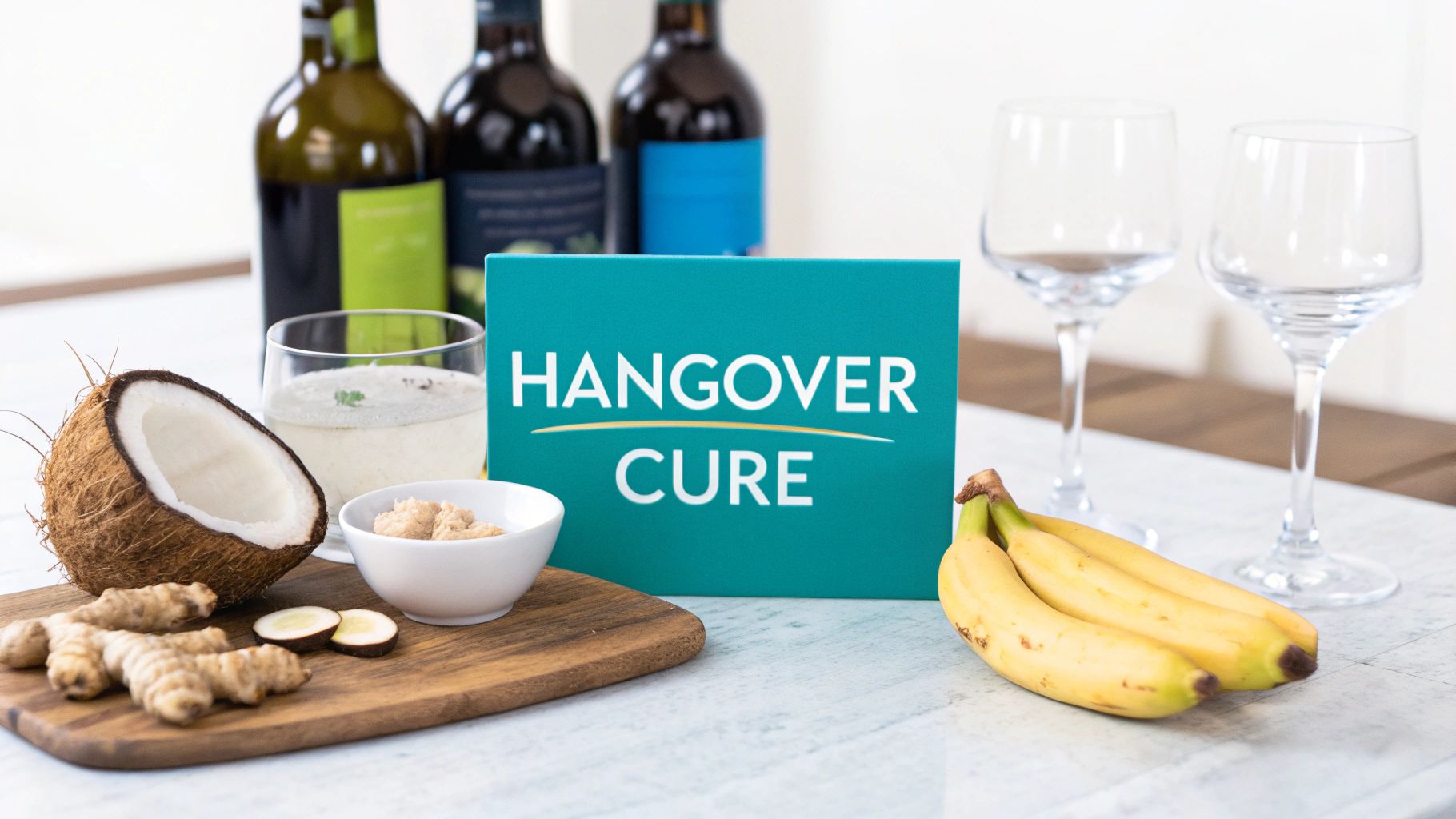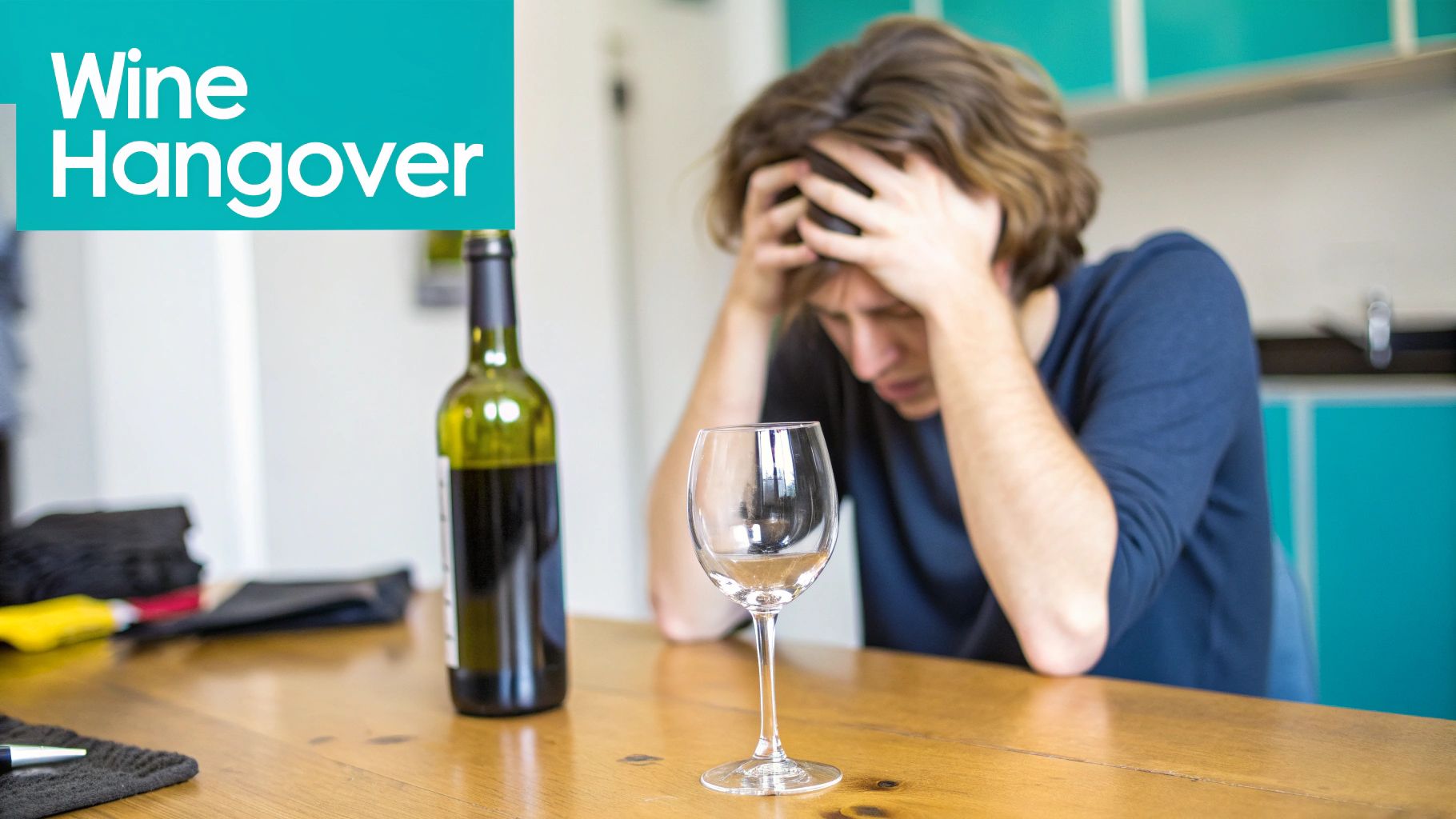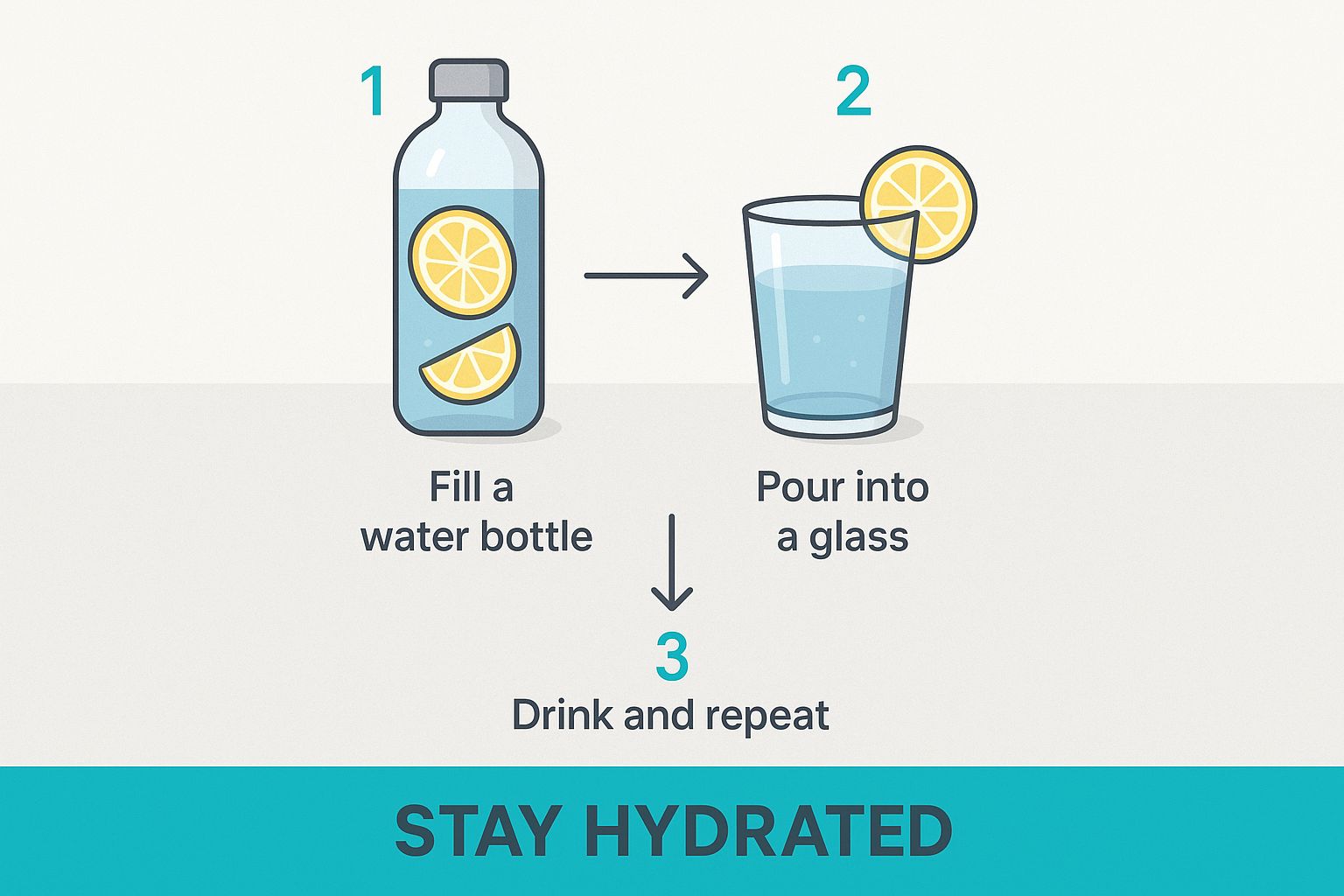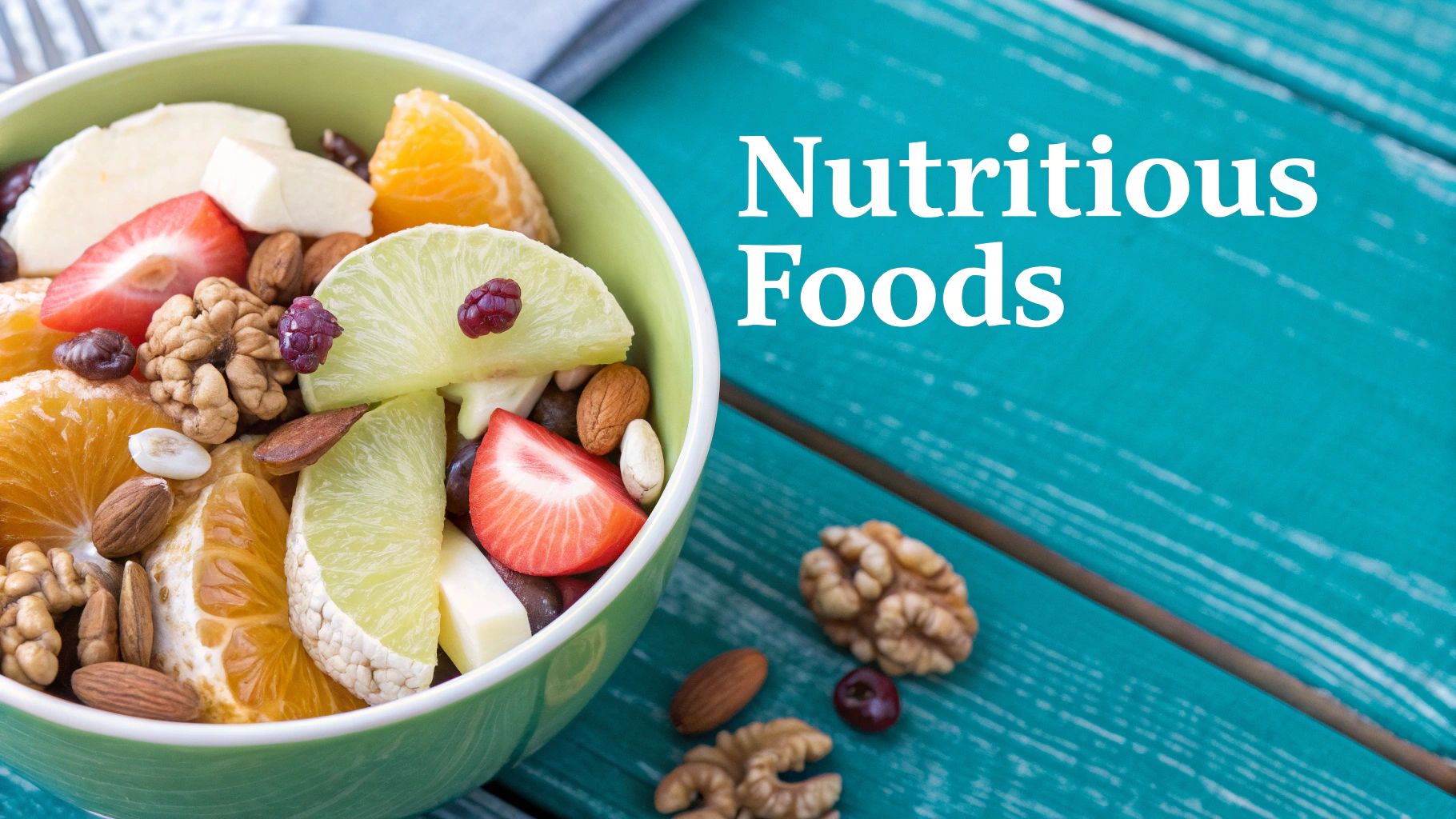

· By Annemarie
Top Wine Hangover Cure Tips & Natural Remedies
Ever had a night with a beautiful Cabernet, only to wake up feeling like you’ve been hit by a truck? You're not imagining things. That notorious wine hangover isn't just about the booze; it's a unique cocktail of compounds like tannins, histamines, and sulfites that really dial up the misery.
Figuring out what’s actually in your glass is the first real step to finding a wine hangover cure that works.
The Science Behind That Killer Wine Hangover

It’s no wonder the global market for hangover remedies is exploding, with projections hitting USD 6.18 billion by 2030. We’re all looking for a fix because we know from painful experience that not all hangovers are the same—and wine often takes the top prize for the worst.
The main reason wine hangovers feel so potent comes down to things called congeners. These are just natural by-products from the fermentation and aging process. They’re what give a wine its unique flavor, smell, and color.
The problem? They also make hangovers a whole lot worse.
The Key Culprits In Your Wine Glass
A few specific congeners are responsible for that dreaded morning-after headache and nausea. Let's break down the main offenders:
- Tannins: These come from grape skins, seeds, and stems. They're what give red wine that dry, slightly bitter taste we love, but for some people, they're a massive headache trigger.
- Histamines: Ever get flushed or a stuffy nose after a glass of red? That’s histamines. They can dilate blood vessels and cause inflammation, leading straight to a pounding headache.
- Sulfites: While they get a lot of the blame, true sulfite allergies are pretty rare. But if you're one of the few who are sensitive, they can bring on allergy-like symptoms that make a hangover feel even more brutal.
The mix of these compounds with alcohol is the perfect storm for a miserable next day. It’s exactly why even a moderate amount of wine can feel so punishing. To get the full story, check out our deep dive into what causes hangovers.
As a rule of thumb, darker wines like a bold Cabernet Sauvignon or a Merlot will have way more of these congeners than lighter options like Sauvignon Blanc. This little fact explains why red wine has earned its reputation for causing the most vicious hangovers. Once you understand the real culprits, you can start making smarter choices and finally find some relief.
How to Prevent a Wine Hangover Before It Starts
Let's be real—the best way to deal with a wine hangover is to stop it from ever happening. A little strategy before you even pop that cork can be the difference between a productive morning and a day spent horizontal on the couch.
It all starts with what’s in your stomach. Drinking wine on an empty stomach is like opening the floodgates for alcohol to rush into your system, and your liver just can't keep up. So, make sure you have a solid meal first. I’m not talking about a sad little side salad; think salmon with quinoa and avocado. Foods packed with healthy fats, protein, and complex carbs act like a buffer, slowing down how quickly the alcohol hits you.
And remember, not all wines are created equal. If you know you're sensitive, you might want to steer clear of that heavy Cabernet or Merlot. Lighter-colored options like a crisp Sauvignon Blanc or a Pinot Grigio generally have fewer congeners—those nasty compounds that are famous for making hangovers a whole lot worse.
Pacing and Hydration Are Your Best Friends
You've heard it a million times, but that's because it works: hydrate, hydrate, hydrate.

Alcohol is a diuretic, which is just a fancy way of saying it makes you pee a lot, draining your body of essential fluids. For every glass of wine you enjoy, your body is losing more water than it's taking in.
A simple rule I live by is the one-for-one method: for every glass of wine, have a full glass of water. It's an easy habit to build and it makes a huge difference in how you feel the next day. This little trick helps counteract dehydration before it can really take hold. If you want to dive deeper into the science, we've got more tips in our guide on how to prevent a hangover fast.
To make it even easier, here's a quick checklist to run through before you start sipping.
Your Pre-Drinking Checklist for a Better Morning
| Action Item | Why It Works | Pro Tip |
|---|---|---|
| Eat a Substantial Meal | Slows alcohol absorption. | Aim for a mix of protein, healthy fats, and carbs about an hour before drinking. |
| Choose Your Wine Wisely | Lighter wines have fewer congeners. | Go for a Sauvignon Blanc or Pinot Grigio over a deep red if you're sensitive. |
| Hydrate Early and Often | Counteracts alcohol's diuretic effect. | Drink a big glass of water before your first glass of wine to get ahead. |
| Alternate with Water | Maintains hydration levels throughout the night. | For every glass of wine, drink one glass of water. No exceptions! |
| Take an Upside Stick | Gives your liver extra support. | Squeeze a stick into a glass of water before you head out. It's a two-for-one! |
Following these steps sets you up for success, but you can give your body an even bigger advantage.
Prepping your body isn’t just about food and water. You can give your system the exact tools it needs to process alcohol more efficiently, and that’s where a little extra support comes in.
This is the perfect time to bring in something designed to help your body's natural detox process. Products like our Upside Hangover Sticks are packed with ingredients that help your liver break down those nasty alcohol byproducts.
Taking one before you start drinking is an easy, proactive step to arm your body for the night ahead. Think of it as the final piece of your hangover-prevention puzzle, setting you up to wake up feeling refreshed and ready to go.
Your Morning-After Natural Remedy Toolkit

So, prevention didn't quite go as planned. It happens. Now it's time for a solid recovery strategy. When you're trying to cure a wine hangover, you’d be surprised to find some of the best tools are probably already in your kitchen. Forget the old myths and focus on what your body is actually begging for.
Your number one priority is rehydration, but chugging plain water isn't always enough. After a night of drinking, you haven’t just lost water; you've flushed out crucial electrolytes. Think about it: every glass of wine, which has about 14 grams of alcohol, can make your body lose an extra 140ml of fluid.
Gentle Foods and Powerful Hydrators
This is where electrolyte-rich drinks come to the rescue. Consider them a turbo-boost for your hydration, helping your body get back in balance way faster than water alone ever could.
- Coconut Water: This stuff is naturally loaded with potassium and other electrolytes. It's a fantastic choice to put back what you've lost.
- Ginger Tea: Known for its magic anti-nausea powers, a warm cup of ginger tea can gently soothe an upset stomach and calm that awful queasy feeling.
- Bananas: A go-to for a reason. They're super easy to digest and a great source of potassium, one of the main electrolytes that alcohol drains from your system.
The goal here is to be gentle with your system. You want to introduce simple, nutrient-dense foods that will stabilize your blood sugar and calm your stomach without forcing it to work overtime.
This kind of practical approach is becoming more and more mainstream, and it's fueling a booming market for hangover relief. In fact, market analysis shows the global hangover cure product sector was valued at USD 2.52 billion in 2024 and is projected to skyrocket to USD 8.67 billion by 2033. This massive growth just shows a huge consumer shift toward effective, science-backed solutions.
For a deeper dive into solutions that will help you bounce back, check out our guide on 8 effective hangover remedies for quick relief. Pairing these natural remedies with a targeted supplement like Upside is really the most effective way to cure a wine hangover because you're tackling your body's needs from all angles.
Giving Your Body a Helping Hand with Supplements
Natural remedies are fantastic, but sometimes your body needs a more targeted game plan to really knock out a wine hangover. This is where a few key supplements come into play, offering concentrated ingredients that get right to the source of the biochemical mess alcohol leaves behind. The best formulas often pack a strategic punch of botanicals and vitamins.
These aren't some kind of magic pill. They work by giving your body’s natural detoxification pathways—especially your liver—a much-needed boost. Think of it this way: your liver is working overtime to break down alcohol, and these ingredients help it process the toxic byproducts way more efficiently.
What to Look For in a Hangover Supplement
A few specific compounds have been shown to be incredibly effective for alcohol metabolism and keeping your liver happy. Let's break down what really makes a difference.
-
Dihydromyricetin (DHM): If there’s a superstar ingredient for hangover relief, this herbal extract is it. DHM helps your body break down acetaldehyde, the nasty toxic compound that’s responsible for most of your hangover symptoms.
-
Milk Thistle: This is a classic liver-protectant for a reason. Milk Thistle is loaded with silymarin, a powerful antioxidant that helps shield your liver cells from damage and supports their natural repair process.
-
B Vitamins: A night of drinking can seriously deplete your body's stash of essential nutrients, particularly B vitamins. Since they’re crucial for energy production, topping them off helps you fight the fatigue and brain fog that come knocking the next morning.
Think of these ingredients as a specialized support crew for your body. While you sleep, they're working behind the scenes to clean up, repair, and refuel your system so you can wake up feeling human again.
This is exactly why products like Upside Hangover Sticks are so effective. They’re formulated with a precise combination of these power-house ingredients, giving your body the exact tools it needs to manage the fallout from a few glasses of wine.
By taking one before you start drinking, you're not just crossing your fingers for a better morning. You're proactively giving your body what it needs to handle what’s coming, which makes for a much, much smoother recovery.
Common Wine Hangover Myths You Should Ignore
When you're desperately searching for a wine hangover cure, you’re bound to stumble across some well-meaning but totally misguided advice. Let's clear the air and debunk a few popular myths that will probably do more harm than good. You deserve a recovery plan that actually works.
The most famous myth of them all has to be the "hair of the dog"—the idea that having another drink the next morning will fix you right up. While it might temporarily numb the pain, all you’re really doing is kicking the can down the road. Your body still needs to process all that alcohol, and you're just delaying the inevitable, probably making the final crash even worse.
Greasy Food and Other Bad Ideas
Another common suggestion? Go all-in on a big, greasy breakfast. This strategy is pretty flawed, mainly because greasy food can seriously irritate a stomach that's already sensitive and unhappy. A heavy meal is a great idea before you start drinking to slow down alcohol absorption, not after the damage is already done.
Don’t fall for these quick fixes that only prolong your misery. The best way to feel better is to support your body's natural recovery with real hydration and nutrients, not hinder it with more booze or hard-to-digest foods.
The thing is, the global demand for hangover solutions that actually work is massive. The Asia Pacific region alone holds around 55% of the global market share, thanks to strong social drinking cultures. It's clear that consumers everywhere are getting smarter about what helps and what hurts. You can check out more insights on the booming hangover cure market here.
So, instead of chasing myths, let's focus on what your body really needs: rehydrating and replenishing all those lost nutrients.
Your Burning Questions About Wine Hangovers
Even with all the science, some questions about wine hangovers just keep popping up. Let's get into the most common ones so you can feel totally confident the next time you open a bottle.
Is Red Wine Really Worse for Hangovers?
So, is red wine actually the bigger villain compared to white wine? In most cases, the answer is a big, resounding yes.
Darker wines, especially bold reds like a Cabernet Sauvignon, are loaded with congeners. These are the compounds—think tannins and histamines—that are pretty much famous for triggering headaches. On the flip side, white wines and rosés have way fewer of these, making them a much gentler choice for most people.
Does a Pricier Bottle Mean No Hangover?
We’ve all wondered this. Does splashing out on an expensive bottle of wine guarantee a less miserable morning? Not exactly.
While it's true that some cheaper, mass-produced wines can have more additives, the real culprits are still alcohol content and those pesky congeners. A super high-quality, aged red might cost a pretty penny, but if it's packed with tannins, it can still deliver a monster hangover.
How Long Does a Wine Hangover Even Last?
This is the million-dollar question, and it really depends on you and how your night went. For most people, a typical wine hangover will hang around for about 24 hours.
But, a few things can make that misery stick around longer. If you’re seriously dehydrated or just extra sensitive to the compounds in wine, you might feel the aftermath for a while.
For some unlucky folks, a wine headache can even spiral into a full-blown migraine, which can last for up to 72 hours. This is exactly why being proactive with a hangover remedy isn't just a good idea—it's essential for your well-being.
What's the Deal with Sulfites?
Ah, sulfites. They get a ton of blame for hangovers, but are they really the bad guy? For the vast majority of us, no.
True sulfite allergies are incredibly rare—we’re talking less than 1% of the population is genuinely sensitive. While they can cause some nasty, allergy-like reactions for that small group, they aren't the source of that skull-crushing hangover for most of us. The real enemy is the tag team of alcohol, dehydration, and congeners.
Ready to stop dreading the morning after? Upside has your back.
Our Hangover Sticks are packed with proven, natural ingredients designed to help your body process alcohol and bounce back faster. You can finally wake up feeling like yourself. Give your body the support it deserves and grab your Upside sticks at https://enjoyupside.com.
